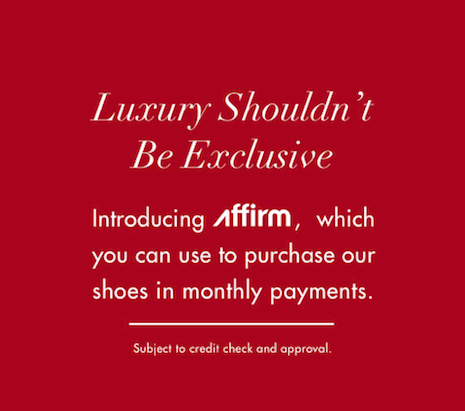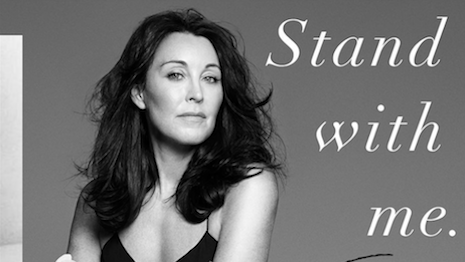Tamara Mellon is aiming to undermine the idea that luxury must be exclusive with a new installment plan that will let lower-income customers afford luxury goods by paying for them over time.
The move is part of a larger effort from Tamara Mellon to take luxury “out of the ivory tower” and make it into something that anyone can aspire to. Definitions of luxury have always been unclear, particularly when it comes to price, but this move shows that a brand can confidently retain its luxury identity while courting less affluent customers.
The price of luxury
Luxury has always been in some way about exclusivity.
A major part of the appeal of wearing a dress from Fendi or a coat from Yves Saint Laurent is that not everyone is able to own those things.
Yet when luxury brands begin to play with pricing, the lines begin to blur, calling into question what exactly makes a luxury brand luxury.

Installment plan. Image credit: Tamara Mellon
Tamara Mellon is set on blurring that line as much as possible, and a new partnership with Affirm continues that trend.
From now on, customers will be able to purchase products on an installment plan, spreading the cost out over time so as not to overload the delicate budgets of lower-income individuals.
For example, with the Affirm plan, a $675 pair of boots can instead be purchased via 12 payments of $60. APR rates range from 10 percent to 30 percent based on a mandatory credit check.
With this plan, Tamara Mellon is catering to the types of customers who save up to buy a few luxury goods, rather than the ones who buy luxury products frequently. In this way, the brand is opening up the luxury business to people who normally would have little ability to enjoy luxury goods.
Blurred lines
The question of how luxury brands should negotiate prices has always been an important and inconclusive one.
According to new research from Euromonitor, accessible items will be the driving force of the $350 billion personal accessories market this year.
In 2017, the category is on track to see 4 percent growth over the previous year, with products such as affordable jewelry and handbags behind much of the increased sales. While lower-priced luxury items reflect a growing opportunity for upscale labels, they should wade into this territory carefully to preserve their positioning (see story).
Luxury retailers are also experimenting with pricing models.

Nordstrom's affordable alternative. Image credit: Nordstrom Rack
In an uncertain retail world, department store chain Nordstrom is banking on its discounted Nordstrom Rack stores by opening a new omnichannel-equipped location in New York's Herald Square.
Nordstrom’s new store will be the second Nordstrom Rack location in New York's Manhattan borough, signaling that discounted stores may be a promising bet in a time of retail uncertainty. That the store will be outfitted with some useful mobile and digital tools shows that Nordstrom is keeping up with some of the latest digital trends in the retail world (see story).
Tamara Mellon’s partnership with Affirm shows that the brand feels confident in retaining its luxury status while still offering a way to expand its customer base with less affluent consumers.
{"ct":"9VQkJL3X1XCyVD8p1JqHdSDLZpqYwDKkPuEiMcih7A+2X1xpHIUcPfDi+bq3PT1A8CuRDDzoZB3JtF6FY1+NLVwSJO0rRTloNg2ZFH0F8Rm7EkR5rq1XhrrbZHIb9\/ghMYXpmgZHFS04PSTfFIguw0sAz\/3SBlCtrlfNaOJXjjCZbGnPsusKgLBxq0VcV75ES7dqemuhWqTSSCBC8CO2UNUMZdlRVkTu9HOkStttu\/kDq31Z2fgFcLP6gEk23Ys7yINprI1Yi1EofHB5VNtfZ2eXzEikF14ufilFM5ZZEL2I+\/2235W198bughZzsU2f\/M9iLzZ+sJdec49X44WzvfVx5qW6dggPKkUJklwxvhLuBPiskgiZwNdkhMrObiGHK\/5k3Y6+u2Se8OjbQ8S69Pvpzg7J9i8Nb5pI+aG13MRKdU+3OR0\/DPuiL\/hn2RNvk1pXB9bcKK0oG9NhHBqixOgZBIMizXb6apmeuNms30O\/x9cet3XCHKiS45Fu3AFu35bWcmnV2Dgr3PqtKGeGBWTNts4Tp+Z1m+TvxNEw6TltIb7mKghXMGcWlkZ4V267SrxoWxDpPhLljVJqH65rzosZKCBj8vGDzOfSU5Hdq0sVK0hXxa+lbwRAfhHsGe13EycNblM4CZ2w5Y+3X8FVAU\/W42SI6jv6I6S6\/70nqkrxaG+YzygbHkcdBgms5EQam6zcLFxmyvR+zp\/5BSR1e3GmvR1eBGfggCI\/jeDJ88hZujUXctJiIMyNb1uePpBBGxJ8XC\/SXXKvC8nZN4bUAGYoXwAWSkLRqItWZ4rGMH5D0IFave31m0s5gu7mECGZnwalDeu1ymR6vmfJfB6q9oufcLk9uWaJW7jz3j1GGXtsQgebv0NynZQXpWWfyb5sqdGgy55gMV+fdhE\/uPCIFrcNYu9Yy+U\/gtpFZ5p+6zSCwnZjm6CxfR+I9kFLiHo02AEwYlfGMybJatHGmoHLW97AnqJkr8CIQ2wuOYlRkJLBkHklaCWJsQgc6\/GIOtGSg+hecDYXIA1ollncA51Kraju0pa7sL6EYzbbj2pEY9jU4Yo9CRXvz5L0BlVufEuVmL61SsGyBeIfRdP2p59BhATTfPf5HyFV0373yDgY0Xw7jiAjcfXsu4KXMBLOixKG3GYhuswtuDQmQtlf1FGJgnXgz+08lsi86CJpYyhZ8dKoalmCfam3\/LfTpW8fpVh8gRf+ua2jU5jWiazGyS1eKP1YvBDtmZ6pCHl5oh1rmKY90aoxTS77SCLQgeMt++3mBttmXvlJBVlsU7nWkmnYWzpgOLrLNCQ1AXwMOIdfriN+E5QrrN6xWMiIWyn4AH3T6xTwVEPY5eWs8vVrQXlGD4ts6RmxYAxVfDs0rMUHl7bUwhTTUjmrSmasAw7xdkhJo8FyOU2qkL4\/OKab6NlCUIfFISQAHkIr\/sbKhLg4JLCKK4qW5Ln4tBeubSY4sPtxjHwggomWcKEZPx0gFnanRwrERk9kgAtjQZ2jWSxzZ19+e5HXQSFqNT+xPeMbx7yEjwWK4I2jKtBQqFwZAF3NsRRv055cspgi5kFegXV\/0C+V\/MhcwKjtZKaXznLreMVSKMDVE6rln+9058C6BubekxETYBGc3K7VFX+9F+QVSAA5xJNyiljnJZIi\/b4NpaaLe0o4KPCW7enWijVEJicogvi1G19TN2pC4TWtxHv4muLvby2fNZwojNXqZDduWfipubsjv\/p\/\/EOjnkcF+h7XkizfgE8PTnfExNV2iGEUYuOJT7NmE0RM7kz0D0931LIRMouFrBoW0dRks+dC1vBXDXLJa0Z2vVZiQ4HjOMpCRQ6lDqO4edaB+uYkkg3ZWznHAc+6ZN1PKvTGEPhRZ4UrNhMb9cT1\/6tcR7H8m\/6Y5Juxl2gRwUc8yRno5syG8ior0KdNxI4wxmoOxvNNRKboco27Lli\/qnk3c+6WJCaNbSkvtlEcQ2AKEok9LyF9f+3m70o0JCPDHzLmKqapUQ848WOuKm\/s9ESFNTvrO7gZv+r+HJ\/tGh7\/KKQ5S8uNjjKFv4HErmPrHWTzGGY9GjH8Baj0m3GT5Suo1icCI27trG9ZuowFnPIWy5vR+QhmtjVj8E1iJA3g5T6bPcVU9VaLIV5zEE\/9r2vSQTrUt7zy8HhJ6r37kPmJU6rvUt1FMn95zCaQNy+P1XzBoMIvHmDpSzEOqIyi3NX34V5708sL\/YJP8SKdyvrXS8bHO557RyThKX\/bVXwR9cXMn+XOqZJOWqZjgIMu84KkswO2ja2AE8DXIIJbpPwHHW0xj1ULJX0TH2e9dyYn\/hivlTd1Yq5srYgJ\/Yrp4lZpnTc51sZpKCHr1R6hC4jE1bQAh9x3mk3NaKMPTE2AIYOD98aDYV1T00NYq7twTSsaIoTl1Ja8vDO36oxncCwEc8Y\/wla15Yl756XY0gOXOjg+GBW608XXM6dWNa7MLg8GWXeKjYgifloVzZY4xFt0\/e4to4FaahOWUun1YYPV7a+8C+lCtblKLOJ9TauQyzcULhp5KFi2orAFicc0jhLq\/eOLjOVqHQqRyZInss5BbMMs8Ies6etGzmnolVYMN8NCsbuwdS+MhvZhiLs0U34xz6t77bolV3BFmny8bIzYpZLVTvkOfh2pLV97EzKNLUyytdR+OG9FVZoaOjoG2jzVHSHfEQxsFDPfEOT0diNJuPxsxjkc1EYcgF+pj+AY+5z+UtqgGb4mWg9ShS2L8gEwNfKL\/M\/XUE83GrohcXRWMrKvtws8oNVgfQcY4dT6yfRvUkemEYBVH7LVZ4sY8m1YxryQu6uQjtWjaG4SZ\/1JYK16XjkKyoUOSeoTtz47LnugkmMwP+c493krhzzQ3jzT21xEmhMmL1yzrLjEQDVC6C07PfhmjKI5komrpBsNUbCnJoZN1oYZ+EIMESYuWyo4hEhPWjbe1bONqAaYS2Vz8Lv7IF3Oy1ODEomPXdNQe2X7apm6UbiblHjWAtPCvI\/2NCp007xGgxVF+GqbGpbOsJgNY3uB4r+oh3IpdOY1jTjrDoPpMTwyHvdVvDMb2nVvdhfTrjF886i5OIf+MEQ39LSRvGFWjhz49jyGncWWQ4r3dfTxMB4WqKo+aOjjwvH0urfm7tGxXFMfQ\/qKL4hmvOGINNyhzuxT4IF8K9neLw5c3FQk56iiYKNq7owRrNHve4vSXt7O0RZasPci3PB9p7HSnlPmXvJ3a0yd7BUItVBMA7lkUblMdiwL2hv1uBrW6YUFbqlF+1q2YJGruO8OZ6pwg4Qpf7S57\/AeRXcQls\/UDaGhZ3elorWUaEY1UslatwAN\/mT9hta+VIVgF2r7KQqje8UwjiYBqWtS\/4I606gijekTdHtPPE6FNMljvFhSyalB3Hi37eqUo3UNpY+skx2xS1iIKz5IFG0bdAXtTx5aWMMWDDFr7elXf8rM7SyMIqGm3k8+bkPaggaTdjqoumvNJidsNt7PbWKXHHIc1tbFFyddLOh6tgh4KmtkhLlBwf1msabF3qp3hG+mSE5gWzNKaKpwM9J2yiA3hxsBZJKLW1onMsfbcVhwn0sAUGhFR4lfegVWWArWh4HJcA5T4WMMqsRlCKbNgg2O85o+wRgfdGR1uypyAz9ihBwnm8ewQOJWVvEBEB+lthE0Hol5wmeGHZ7MayrfYMF\/xrMXOAgVxT1I8p0zByxVoQMg50A+h2T0BSNAwd2zix0eHigLOBlL3J0pKgWfJnBHSwShLtAwRGFI\/MmFQRgSVNsk+rhSx1whx48irW1gJG1ziChOAg91XxbLTcBMeNPNT0gqicGusrSnYWfyqaw7uXSh7y7AnbbgZjojyDQZlNhelZKGCSldEycQhFzFr9vNjx1uNY4fGVFboRLYg6jw8YsL7b41EEz9H+lsmtyXSdSZ8o1O9k9hDPaSoVaOSCG+VnnCqFiqEoa6b4FpYKBSudgHF0id7VLtDA+6caaujJwrC2HUwaXOaYCoMtCzaawYMEclQuwX8KuobAnoLw0arKiMaGQZIeTYUGv2O4cDNWw9q7WCEw4vowBO\/4lUuX6vkL+Wd5bEp5W\/dEivLlKMlHJCA5q\/jao1R4ZiESwy6hL2yvhURab1QUwdolDAYraNxXSq+G+Av+GNig1I47XToGRWzY+8id3P1KUP8VI2L\/ibD4e2aOG52hi4xeKrrPnb+F45ghMm7h34ImrPdZX06jvEKhoaMs78c\/8dk1Bdmxbe7vATF0BWz1\/kKL77rdEOeCmxZoGXyEoKMjUCSm7U04g8GHRlMQixU9+tqKBQssoWz8XGl0RX503ss0iQm8fHyex3QB7CVSKZt6+HhEdtrXNwvhtVHFBuXHq\/XicuRdzCNrHsvkBWL9vuHsi1f\/7GYc5t0pYAIag1sEqpnq9VhnmLeyaLCMjGqiqvqxEfn1N88wzb27AP+n96rVyfL\/X98Ky4hWsy\/iSdZOsLAZp7NwTJT0Dtkho9NOG52WacxoVpDhAQorlZLoQ9DE8zDiZSTiZxZVVkq08jK1dPvHu+NOQBRJNmHWfs1Uv4dKtw5qamXPM6OVJiK4abEVZN3ceVa27fZtYOMRXIOGj\/59qfy\/Ron4GuSolwAhwqApr2FTfJQDn8cDisbDYrfd+ROf1t4O1QciZBjF+BPQc11ewDCpreztmzNFApygR\/mSZV3Fcy5qXhftwD+RkoyYqByqHqGK9JYixbVqUPIhalNYYOtcRmFZEJUY5GRJnFVdiBAVsydruD8iHtzkMtkFuvNsGWB80SV4Rjz0QuIyTszdxDTwGUYnM2eju53Ni7EIlGqKggQ6ibCrLx9P78l6XQ6OLj1siIaWrTvVe3h50yhSn7GxzeAnALYOdZXF3bwm4Gl74A3pJ\/62Mq+o5vXXA\/BakvPuy7MODCbODpjZUi7y63uUlaaPP1m5rurUj1faT0fYtrwjkmbaA6fGXfsZegvbkgJLGCAVhfAKqSTDOidlBQMmP8+XMsAletLRmf834\/23P6RgpVf8apiU7BwvNendpGUcGR4pVeU01zh3zeCwE\/WynGGec3zpvP3sCOiHpo3\/MpVzG+hiFLZRXjOyZ4aBTQ1eUMjHCgCQSUuf3wsPb6p8T\/Hwigr02xbuzA5uO3+KlEYixGcw2ZNpnEF5VyokrCvruLZgDeZKa34o\/yNjkCeoUz4jQRXmpRRW4d8WFTn02aWhPNU7XTZq33CMJbOQyqEOefyHbit6Sogm8u9FaTDKyHqXuy5tmcJNXSdRL1Pa9FUtyKYXD2DXOkRDa3rVTTmP53mr\/9pz3nUE7Ky2bXJJzNdOekWXcJ96iZQ7XytHZT16J13\/JHcdiPL1+r16mUbDkAsTIy0TdLw4wjoqrP7Wkw4PIn38O3vFzehpqoB0tdgWI9J\/I2Ws8H+KS2NPnGKNJBNPWoS0xiEa5H9GX8GWYuob6+y3CH2+ahuMltPmImkzNZ\/YQmmXlo+M7nXZmrdTAYg35q8PT0uECMOCYuP9cQBq7uwRE5CqJO0hyDJfeKjKR5Fni32evWwAYfl04otV6p6pD943iAFl6ei9VHQonJQouHl2t0NqgazZyAwbTH3Hvdl2wpLjGKQY6Gxicutv2O8HBLNPmTVaR1kQzmcjyiYtV0q9o5HWSMUW2OMKQ02K4OSYa3tyhO\/4Y86VhpbtCZQTwSC0ZziG\/cTwIOomPmbkWLP0QYstagKJQQbACjUH5x9pRpXQxY+F7nelNH4VfUsc5dZ1tixQvbmzul9SeIp5cWW+WZmyTVAs9HiNsxPxH2WNAzpybUy1HVzMmrXLoY\/0\/W6SA4Y6ABlVlnWiKBbPl47UXkEYScWfA7v\/UJRZSbSQ9Y+gcUF6FrFHUXQbs+boCNFzMFR4hrcaDYu6DlSz1PojLac4a0QGowkCkQUFuM+ZY3pabVVk0vIegFdAoOZR0XO5uYb+EtBOrLcWuCH3HuuUL+TMTY5eXF4TmclUZk4rGFRRJjbaIW\/cCo\/B5unWKPkpURffBGYG8=","iv":"aa8b246c322355ef3214228b8cb08bab","s":"eb618abcf923a66e"}

 Tamara Mellon wants luxury to be more affordable. Image credit: Tamara Mellon
Tamara Mellon wants luxury to be more affordable. Image credit: Tamara Mellon